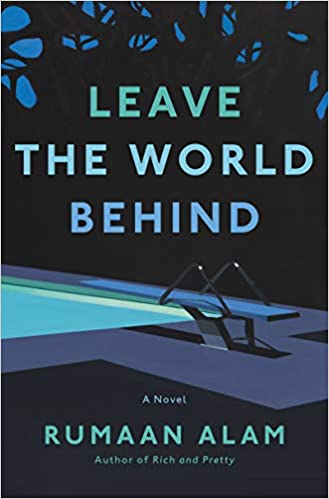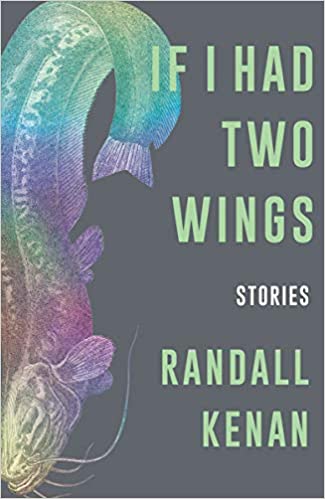Electric Lit relies on contributions from our readers to help make literature more exciting, relevant, and inclusive. Please support our work by becoming a member today, or making a one-time donation here.
.
Autumn means changing leaves, apple-based baked goods, decorative gourds, pumpkin spice lattes—and an avalanche of literary award longlists. If you’re feeling overwhelmed by all the must-read National Book Award nominees you’re now realizing you didn’t read, why not base your TBR pile off of your favorite fall food? If nothing else, it’s an excellent excuse to go out and restock your pantry, so that you’ll have reading snacks on hand.
Apple crumble: Leave the World Behind by Rumaan Alam
You can’t get more American than apple pie, so they say—which means that a deconstructed version is the perfect pairing for Alam’s provocative novel about a crumbling vision of the American Dream. A white Brooklynite couple plans a summer getaway to Long Island; however, their idyllic plans are shattered when an older Black couple shows up, claiming to be the owners of the house. They have evacuated New York City due to a sudden blackout. Amidst global catastrophe, the tensions between the two different families escalate and the very idea of safety itself is questioned.
Pecan pie: Interior Chinatown by Charles Yu
Are you one of those that reject the stereotypical pumpkin pie/apple pie binary, opting for dark horse candidate pecan as your fall pie of choice? If so, try Yu’s ambitious novel about Willis Wu, a self-identified “Generic Asian Man” who acts in bit roles for a never-ending cop show—the most Willis can hope for is to achieve the status of “Kung Fu Guy.” Structured as a screenplay itself, Interior Chinatown is a deft satire of Hollywood stereotypes. Like a pecan pie’s darkly spiced, sweet filling, Yu’s dark humor pervades the narrative, as does his lingering, poignant questions about representation and racism. Plus, rumor is that Chinese five spice powder makes for a killer secret ingredient in a good pecan pie.
Pumpkin spice latte: The Vanishing Half by Brit Bennett
Pumpkin spice lattes have become synonymous with “basic” whiteness. So why tie them to this bestselling novel by a Black author about family and racial identity? Hear me out: “pumpkin spice” has taken on a set of connotations that are wholly divorced from actual pumpkins or even pumpkin pie; one could argue that pumpkin spice is a construct (check out this image for a better explanation). Bennett’s novel helps illustrate how race, too, is a social construct. The Vanishing Half is centered on two identical twins, whose lives take very different paths—one chooses to pass as white, the other does not. Through the twins’ family saga that spans multiple generations, Bennett explores the American question of “passing,” while also probing at the tension between individual choice and societal responsibility. And all constructs and symbolism aside—there’s no denying that both pumpkin spice lattes and Bennett’s prose are addictively good.
(Bobbing for) raw apples: Shuggie Bain by Douglas Stuart
Nothing tastes as memorable or as uncomfortable as an apple that you’ve managed to finally catch, after many minutes of dunking your head into dirty, cold water. Stuart’s much-acclaimed debut (it is also a Booker Prize finalist) is just as unforgettable—and equally unsettling. Set in an economically destitute Glasgow in 1981, Shuggie Bain centers on a family struggling with alcoholism and poverty. Shuggie, a lonely but sweet boy, is the only child that will not abandon his alcoholic mother, Agnes. Warning: Like bobbing for apples, Shuggie’s heartbreaking story about the consequences of addiction and the tenuousness of familial love may leave your face wet.
Apple cider donuts: If I Had Two Wings by Randall Kenan
As Kirkus Reviews notes, this short story collection is “mouthwatering and matter-of-factly haunted.” What better book to read as you traipse through (potentially) haunted orchards, munching on an apple cider donut? If I Had Two Wings explores life in Tims Creek, a fictional small town in North Carolina, through ten stories. Kenan, a beloved author who passed away this August, masterfully blends the line between the mundane and the unearthly; his collection includes both river goddesses and small town diners, ghosts and retired plumbers. Kenan’s collection so masterfully explores the idea of appetite—as sexual desire, as hunger, as reveling in a feast—that having a delicious snack on hand is a must.
Roasted chestnuts – A Burning by Megha Majumdar
If you’re into the vibes of chestnuts roasting over an open fire, seeing the charred skins crackle open, try Majumdar’s equally-heated debut novel about power and corruption in modern-day India. A Burning begins with a terrorist attack that burns many to death; Jivan, an innocent observer, is thrown into jail when she posts a careless comment about the attack on Facebook. Jivan’s fate gets wrapped up with two other city residents: PT Sir, a PE teacher, and Lovely, a trans woman and aspiring actress. As all three characters aspire to achieve their version of power, they run into questions about morality and justice. Majumdar crafts a thrilling narrative that moves at a breakneck pace and plays with high stakes—one moment later, someone may end up destroyed, like a chestnut left too long in the flame.
Cranberry sauce: The Index of Self-Destructive Acts by Christopher Beha
Cranberry sauce conjures up memories of Thanksgiving dinner—and the accompanying family drama—like no other food except turkey. If you’re looking for a book that’s equally vivid, flavorful, and prone to messy drips, try Beha’s family saga. A young journalist, Sam, becomes acquainted with the Doyles, an affluent family in New York City. Frank, the patriarch, is a baseball writer who is in hot water for making racist remarks. Over the course of one baseball season in 2009, Sam witnesses the disintegration of the Doyle family’s established empire. Like a sauce that has been simmering on the stove for hours, Beha’s narrative smushes a variety of themes and characters into a cohesive, sweeping portrait of one family and New York City.
Hot toddy: The Secret Lives of Church Ladies by Deesha Philyaw
It is a well-known fact that you can put a hot toddy in a mug, and no one will ever be the wiser. Philyaw’s debut collection of short stories explore the lives of churchgoing Black women that are similarly secretive and gently spicy. In one story, a teen girl has a crush on the preacher’s wife; in another, a woman refuses to go to church because she will no longer wear a girdle. Philyaw’s characters explore, in various ways, what it’s like to publicly follow the rules of the church whilebreaking them in private, discovering new truths about themselves. Warm, intimate, and filled with verve, this short story collection will give you a wholesome buzz with or without the booze.
Caramel apples: A Children’s Bible by Lydia Millet
If this is your favorite fall food, I am genuinely confused—but there is a perfect book pairing for you. Millet’s tale starts at a lakeside summer resort (think: sticky-sweet caramel exterior), where a group of families are vacationing. However, things take more of a turn towards Lord of the Flies when a storm hits, leaving the adults apathetic and the kids to fend for themselves (cue: the mealy, bland apple interior). As author Jenny Offill notes, Millet offers a “cozy catastrophe” with a climate change twist; her narrative is both apocalyptic and allegorical, filled with pressing questions about responsibility, environment, and civilization. As a kid, I remember finding caramel apples to be consistently disappointing—but that disappointment does not hold a candle to the crisis-ridden, ecologically-devastated world that is fast becoming the legacy for kids today.
Pumpkin bread: The Great Offshore Grounds by Vanessa Veselka
Arguably one of the best snacks for a fall road trip, pumpkin bread is a twist on the usual pumpkin pie. With a mix of spiced humor, reinterpretation of “family,” and dense, interlocking narratives, The Great Offshore Ground may be the book for pumpkin bread fans. Set in the Pacific Northwest, the novel centers on two sisters, Cheyenne and Livy, and their adopted brother Essex. At their father’s remarriage, Cheyenne and Livy reconnect with one of their biological mothers, Kirsten—who raised them, but only gave birth to one of the girls (and refuses to specify which). This triggers a road trip to find their other birth mother, who lives across the country in Boston; meanwhile, Essex enlists in the Marines for lack of anything better to do. Veselka draws a sharp family portrait of contemporary American poverty, one that’s both rich and thought-provoking.










